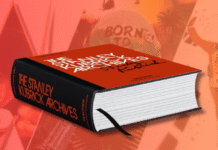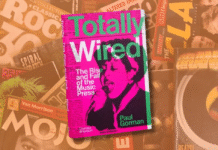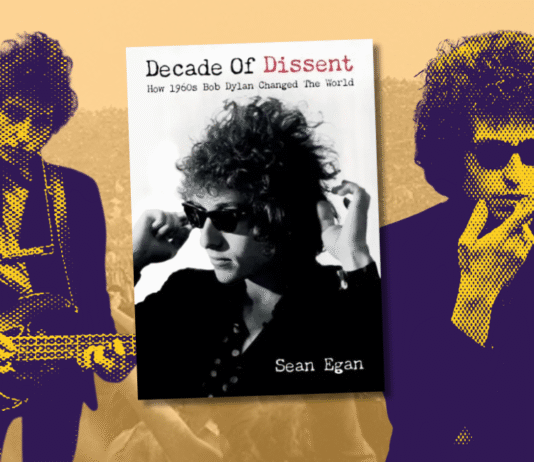Quentin Tarantino Wrote a Book. It’s Just as Subtle as You’d Expect.
Some people age gracefully. Quentin Tarantino ages like a VHS copy of Taxi Driver left in a tanning bed. Cinema Speculation is his first non-fiction book, and it’s everything you’d expect from the man who once described a character’s demise via bear trap to the face: loud, smart, inappropriate and weirdly affectionate.
This isn’t your typical critical treatise. There’s no highbrow waffling, no polite nods to obscure Italian Neorealists. This is a fistful of film geekery delivered with the giddy aggression of a kid high on Coke (the drink or the powder – dealer’s choice). It’s a love letter to the grubby, violent, gloriously imperfect cinema of the 1970s. And like all good love letters, it’s riddled with nostalgia, swearing and long-winded tangents.
Table of Contents

What Is Cinema Speculation Actually About?
At its core, Cinema Speculation is Tarantino rambling about the movies that shaped him like a particularly violent deity. The focus is largely on 1970s American films – Dirty Harry, Bullitt, Deliverance, Taxi Driver, Rolling Thunder – basically, anything involving morally ambiguous men in flammable trousers shooting people in slow motion.
But this isn’t just plot summary with a side of smug. Tarantino dissects each film with forensic glee. He praises what works, annihilates what doesn’t and even rewrites history with his trademark speculative tangents: “What if Brian De Palma directed Taxi Driver?” (Spoiler: there’d be more boobs.)
He blends critique, autobiography and batshit hypotheticals like some deranged cocktail of Pauline Kael and a Reddit thread run by your drunk uncle. And somehow, it works.
A Masterclass in “I Was There, Sort Of”
Tarantino’s genius lies in making you believe he was everywhere at once. He recounts seeing The Getaway in a dingy Los Angeles theatre as a kid, complete with fistfights, racism and the smell of stale popcorn – a sensory journey straight into America’s cinematic underbelly.
There’s something perversely charming about a man recalling how his mother’s friend (a Black sex worker named Reggie, naturally) took him to R-rated movies as a child. And people wonder why he turned out like this.
But it’s not just about the movies. It’s about what they meant to people, how they reflected a country coming apart at the seams, and why, in an era of Marvel spandex and sanitised franchises, that gritty, anarchic energy feels so damn vital.
Film Theory, Tarantino Style: Say Goodbye to Academic Nonsense
Most film books suffer from one of two afflictions:
- Academic snoozefests written by people who think emotion is gauche.
- Fanboy fluff that treats movies like sacred relics rather than flawed art.
Tarantino, to his credit, avoids both. He has the vocabulary of a professor and the restraint of a toddler with a flamethrower. He’ll explain mise-en-scène and narrative structure one minute, then say a director “sucked donkey balls” the next. Charming.
He also has no patience for critical groupthink. He calls out revered films that bored him. He sings the praises of movies that critics dismissed as trash. You might not always agree with him, but you’ll never accuse him of playing it safe. Honestly, when was the last time a film book made you laugh out loud – and not just because it accidentally cited Armageddon as important cinema?
The Tarantino Tarantula: Tangents, Tributes and Theories
Let’s talk about the structure. Or lack thereof.
Cinema Speculation lurches from one idea to the next with the grace of a drunk John Cassavetes character. Each chapter is loosely built around a film, but don’t expect a clean academic arc. What begins as a review of Hard Times quickly morphs into a meditation on Charles Bronson’s face, followed by a theory about Steve McQueen’s cocaine intake, then a sidebar about William Friedkin threatening a studio exec with a gun.
Yes, really.
But there’s a method to the madness. Tarantino isn’t writing a syllabus. He’s inviting you into his brain – a tangled, popcorn-slicked jungle where cult classics and childhood trauma coexist in perfect disharmony.
Highlights from the Book (or “WTF Did He Just Say?” Moments)
- On Walter Hill: “The man makes movies the way a steakhouse cooks meat – bloody, brutal, and barely legal.”
- On Steve McQueen: “Cooler than a fridge full of corpses.”
- On Taxi Driver: “A cinematic howl from a country vomiting up its conscience.”
- On critics: “Most of them were wrong. Some of them were idiots. A few should have been arrested.”
In short: Tarantino writes like someone who has definitely been banned from at least one university library.
Who Should Read This?
- Anyone who’s ever shouted “they don’t make ‘em like that anymore” into a pint glass
- Film students who want a crash course in 70s cinema without needing a dictionary
- Tarantino fans wondering what’s going on in that chaotic mind
- People who enjoy books that scream at you through the page
- Cynics looking for something both deeply personal and entirely unhinged
My Final Thoughts: A Love Letter Written in Gunpowder and Spit
Cinema Speculation isn’t perfect. It’s messy, indulgent and occasionally deranged. But it’s also brilliant, hilarious and infectiously passionate. It reminds you why we fall in love with movies in the first place – not because they’re tidy or flawless, but because they make us feel something.
In a world where criticism has been reduced to thumbs, stars and soulless aggregators, Tarantino’s unapologetic verbosity feels radical. Like being cornered in a bar by a film-obsessed lunatic with questionable hygiene and excellent taste – you’re annoyed, fascinated and weirdly entertained.
And really, what more could you want from Quentin Tarantino in book form?

Cinema Speculation
A unique cocktail of personal memoir, cultural criticism and Hollywood history by the one and only Quentin Tarantino.
The long-awaited first work of nonfiction from the author of the number one New York Times bestselling Once Upon a Time in Hollywood: a deliriously entertaining, wickedly intelligent cinema book as unique and creative as anything by Quentin Tarantino.
In addition to being among the most celebrated of contemporary filmmakers, Quentin Tarantino is possibly the most joyously infectious movie lover alive. For years he has touted in interviews his eventual turn to writing books about films.
Now, with CINEMA SPECULATION, the time has come, and the results are everything his passionate fans - and all movie lovers - could have hoped for.
Organized around key American films from the 1970s, all of which he first saw as a young moviegoer at the time, this book is as intellectually rigorous and insightful as it is rollicking and entertaining.
At once film criticism, film theory, a feat of reporting, and wonderful personal history, it is all written in the singular voice recognizable immediately as QT's and with the rare perspective about cinema possible only from one of the greatest practitioners of the artform ever.
3 More Books to Read if This One Breaks Your Brain
Easy Riders, Raging Bulls by Peter Biskind
Sex, drugs, and auteur ego tantrums. A juicy, behind-the-scenes chronicle of 70s cinema. Tarantino probably read it with a whisky and a notepad.
The Big Goodbye by Sam Wasson
If Chinatown is your jam, this is the gorgeously written deep dive into its creation, complete with Polanski nightmares and Jack Nicholson charm.
Adventures in the Screen Trade by William Goldman
Goldman’s witty, cynical take on Hollywood is practically the missing link between Tarantino and actual professionalism.















